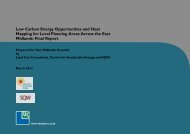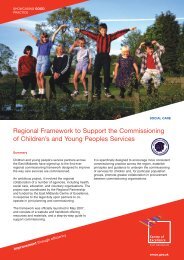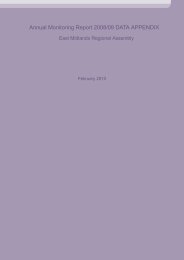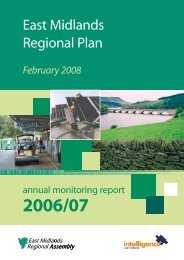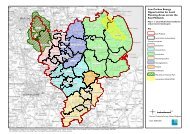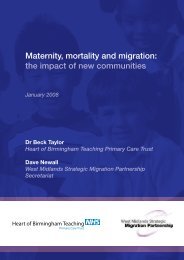East Midlands Regional Spatial Strategy 2005/06
East Midlands Regional Spatial Strategy 2005/06
East Midlands Regional Spatial Strategy 2005/06
Create successful ePaper yourself
Turn your PDF publications into a flip-book with our unique Google optimized e-Paper software.
Key Points<br />
Studies by the <strong>Regional</strong> Assembly as part of the<br />
development of the revised RSS have shown that<br />
the region will be short of water in the future if<br />
measures are not taken to reduce water use,<br />
particularly in new developments<br />
The EU Water Framework Directive will continue to<br />
be a key driver for the protection and improvement<br />
of the water environment for the next 25 years, with<br />
its central concept of integrated water resource<br />
management for water basins<br />
A significant number of Strategic Flood Risk<br />
Assessments have either been undertaken, or are<br />
planned, to better understated and respond to<br />
development proposals in relation to flood risk<br />
Only 6 local authorities supplied figures on<br />
Sustainable Drainage Schemes (SuDS); in all<br />
planning permission was granted for 13<br />
developments which contained SuDS<br />
The uptake of Combined Heat and Power (CHP) has<br />
remained less than expected<br />
The region has seen much increased interest in<br />
wind development and the number of installations<br />
is expected to increase markedly in the next year<br />
The region has challenging targets for renewable<br />
energy generation and there is uncertainty that all<br />
the targets will be met<br />
Actions<br />
The Region’s response to the EU Water<br />
Framework Directive will be led by the<br />
Environment Agency and will be worked out<br />
over the coming months<br />
Progress is being made on undertaking<br />
Strategic Flood Risk Assessments, which are the<br />
responsibility of local authorities; the role of the<br />
Environment Agency in these studies, as set out<br />
in PPS25, needs to be established in each case<br />
SuDS still appears to be an issue that does not<br />
engage local authorities. Action is required to<br />
ensure increased implementation through the<br />
<strong>Regional</strong> Plan<br />
The move towards carbon neutral and zero<br />
carbon development (in the emerging <strong>Regional</strong><br />
Plan) may well provide another driver in favour<br />
of CHP<br />
<strong>East</strong> <strong>Midlands</strong> <strong>Regional</strong> <strong>Spatial</strong> <strong>Strategy</strong> Annual Monitoring Report <strong>2005</strong>/<strong>06</strong><br />
73





